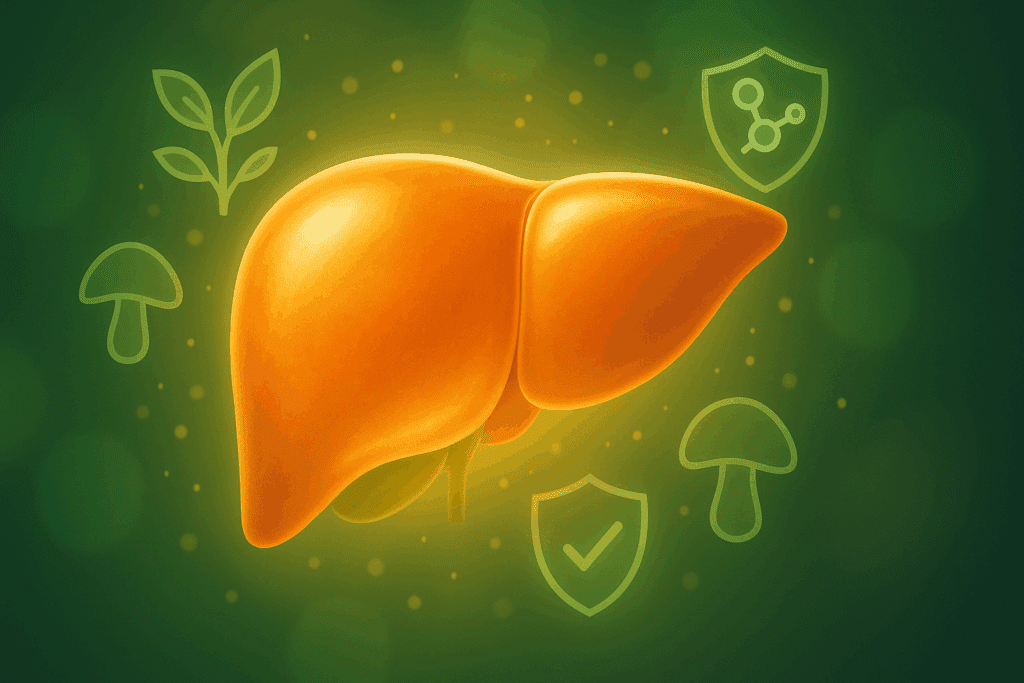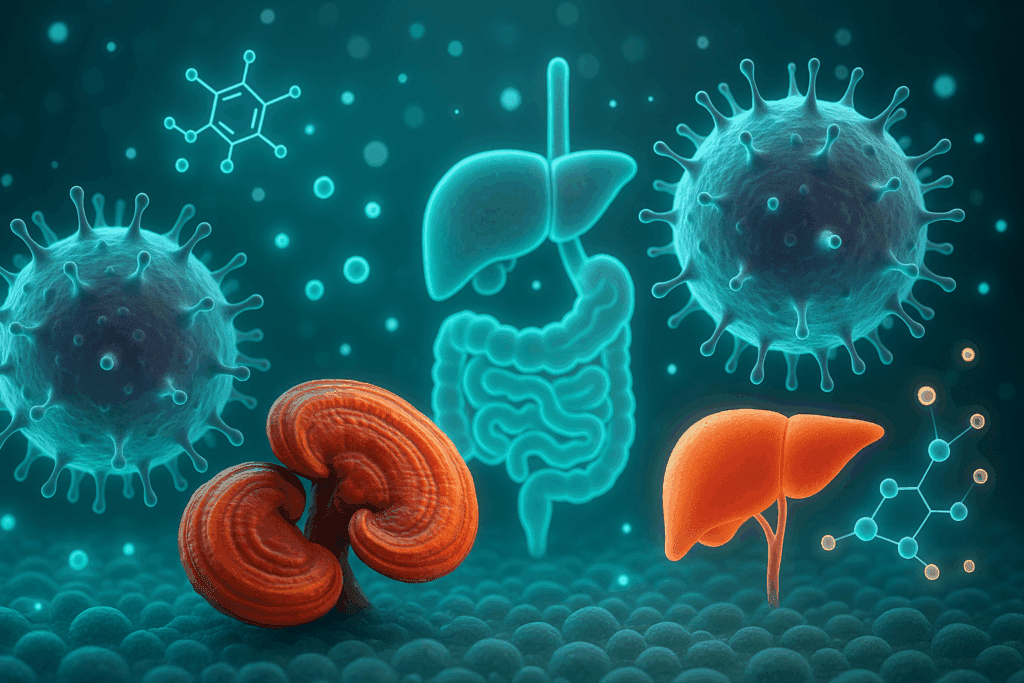Mushroom coffee has emerged as a fascinating alternative to traditional caffeinated beverages, promising a wide array of health benefits rooted in ancient herbal traditions and modern nutritional science. As consumers become more mindful of their dietary choices and seek ways to support both physical and mental well-being, questions about its impact on vital organs and emotional resilience have taken center stage. One such question gaining momentum in wellness communities and clinical circles alike is this: is mushroom coffee good for your liver? This question, layered in complexity, requires a nuanced exploration of the compounds present in mushroom coffee, their interaction with hepatic functions, and the broader implications for managing stress and anxiety.
You may also like: The Essential Guide to Reishi Mushroom Benefits: How to Use Reishi Mushroom Powder for Stress Relief and Adaptogenic Support

Understanding Mushroom Coffee: Origins and Composition
To grasp the significance of mushroom coffee in health discussions, it’s essential to understand what it actually is. Unlike traditional coffee that is brewed solely from roasted coffee beans, mushroom coffee is a blend that typically combines ground coffee with medicinal mushroom extracts. These mushrooms aren’t the culinary varieties found in grocery aisles but rather adaptogenic fungi with a long-standing history in traditional Chinese medicine and Ayurvedic practices. Commonly used mushrooms include reishi, chaga, lion’s mane, and cordyceps, each carrying its own portfolio of health-supporting compounds.
Adaptogenic mushrooms are known for their unique ability to help the body adapt to stress and restore physiological balance. They contain polysaccharides, antioxidants, triterpenes, and beta-glucans, which are believed to play critical roles in modulating immune responses, reducing inflammation, and supporting organ function. When infused into coffee, these mushroom extracts provide a synergistic experience that delivers both the familiar stimulation of caffeine and the grounding, modulating effects of medicinal mushrooms.

How Mushroom Coffee Interacts with the Liver
The liver is one of the most vital organs in the body, responsible for a wide range of functions including detoxification, nutrient storage, and hormone metabolism. Given this complex role, maintaining liver health is a top priority for anyone pursuing a wellness-oriented lifestyle. This is where the inquiry into whether mushroom coffee is good for your liver becomes particularly relevant.
Reishi mushrooms, a common component in mushroom coffee blends, have been studied for their hepatoprotective effects. Research has shown that reishi contains triterpenoids and polysaccharides that may help reduce oxidative stress in liver tissues and support liver cell regeneration. These compounds are believed to assist in stabilizing elevated liver enzymes, a common marker of liver stress or damage. Furthermore, animal models have demonstrated reishi’s potential to counteract liver fibrosis and inflammation induced by toxic agents, such as alcohol or high-fat diets.
Chaga mushrooms, another staple in many mushroom coffee products, are rich in antioxidants like superoxide dismutase and melanin. These compounds are thought to shield the liver from oxidative damage and support cellular repair mechanisms. Given that oxidative stress plays a central role in the progression of liver disease, including non-alcoholic fatty liver disease (NAFLD), the inclusion of chaga may offer meaningful support to liver function.
Is Mushroom Coffee Good for Your Liver During Detoxification?
The liver’s role in detoxification is often misunderstood in popular wellness narratives, which sometimes exaggerate the notion of “cleansing” the liver. In reality, the liver is inherently self-cleaning, equipped with enzymes like cytochrome P450 to process toxins, drugs, and metabolic byproducts. The goal of supporting liver health is not to detox it per se, but to enhance its existing detoxification pathways and reduce the burden of oxidative stress.
Mushroom coffee, particularly when enriched with reishi or chaga, may support this process through its antioxidant and anti-inflammatory properties. Triterpenoids in reishi, for instance, are known to activate nuclear factor erythroid 2-related factor 2 (Nrf2), a protein that regulates the expression of antioxidant proteins. Activation of Nrf2 leads to an upregulation of genes involved in detoxification and cellular defense, thereby potentially enhancing the liver’s resilience against environmental stressors.
Chaga’s contribution lies in its high ORAC (Oxygen Radical Absorbance Capacity) score, which signifies potent antioxidant activity. Consuming chaga-infused mushroom coffee may help neutralize free radicals that burden the liver and contribute to cell damage. By reducing this oxidative load, mushroom coffee could theoretically support the liver’s natural detoxification functions more efficiently.

The Impact of Adaptogens on Stress and Anxiety
Beyond its implications for liver health, mushroom coffee is gaining attention for its role in stress reduction and anxiety support. Adaptogens, the active constituents in medicinal mushrooms, work by modulating the hypothalamic-pituitary-adrenal (HPA) axis, a central stress response system in the body. Chronic stress can dysregulate this axis, leading to elevated cortisol levels, fatigue, and even impaired cognitive function.
Reishi mushroom, sometimes referred to as the “mushroom of immortality,” is particularly noted for its calming effects. Studies have suggested that reishi may influence gamma-aminobutyric acid (GABA) receptors in the brain, promoting relaxation and reducing symptoms of anxiety. Regular consumption of reishi-containing mushroom coffee may offer a subtle but cumulative benefit in managing everyday stress, especially when paired with lifestyle interventions such as mindfulness or regular physical activity.
Lion’s mane mushroom, another adaptogen frequently found in mushroom coffee, is known for its neurotrophic properties. It contains compounds such as hericenones and erinacines that stimulate the production of nerve growth factor (NGF). NGF is critical for the maintenance and regeneration of neurons, and by promoting its synthesis, lion’s mane may help mitigate cognitive decline and improve mood stability. Although the direct effect on anxiety may be secondary to these cognitive benefits, many users report a clearer, more focused mental state after consuming lion’s mane-infused coffee.

Why Reishi Coffee Benefits Go Beyond Relaxation
Reishi mushroom coffee offers a uniquely holistic approach to health, combining both physiological and psychological benefits. The reishi mushroom coffee benefits extend far beyond a transient mood boost, offering deeper physiological support that includes immune modulation, anti-inflammatory action, and even metabolic regulation. One study found that reishi supplementation in mice led to reduced fat accumulation in the liver and improved insulin sensitivity, which are both significant markers of metabolic health.
Additionally, reishi may support cardiovascular health by promoting nitric oxide production, which helps relax blood vessels and lower blood pressure. This vasodilatory effect can be particularly valuable for individuals experiencing stress-induced hypertension. By incorporating reishi into your daily routine through mushroom coffee, you may enjoy these systemic benefits in a convenient, enjoyable format.
The synergy between reishi and coffee itself also plays a role in its efficacy. Traditional coffee, while energizing, can sometimes trigger jitteriness or elevate anxiety levels in sensitive individuals. The adaptogenic qualities of reishi help temper this effect by balancing the stimulatory properties of caffeine with grounding, calming compounds. This makes reishi mushroom coffee an excellent choice for those seeking sustained energy without the typical crash or nervousness associated with regular coffee.
Reishi Mushroom Coffee Benefits for Mental and Emotional Resilience
One of the most intriguing aspects of reishi mushroom coffee benefits is their potential to enhance emotional resilience. Emotional resilience refers to the ability to adapt to stress, overcome adversity, and maintain psychological well-being during challenging times. This quality is increasingly important in a world where burnout and chronic anxiety have become widespread issues.
By modulating the HPA axis and influencing neurotransmitter pathways, reishi may foster a more balanced emotional state. Preliminary studies suggest that reishi extracts can reduce markers of anxiety and depressive-like behavior in animal models, pointing to potential applications in mood support. While human trials are still emerging, the anecdotal evidence is compelling. Many users report that after switching to mushroom coffee, they experience a smoother, more even energy throughout the day and greater emotional stability under pressure.
Moreover, the ritual of preparing and consuming mushroom coffee can in itself be a form of self-care. The act of brewing a warm, adaptogen-rich beverage can serve as a mindful pause in a hectic day, reinforcing psychological habits that contribute to resilience and stress management. When combined with proper sleep, nutrition, and movement, reishi mushroom coffee becomes a powerful ally in cultivating mental wellness.
Is Mushroom Coffee Good for Your Liver Over the Long Term?
Long-term liver health is influenced by a constellation of factors, including diet, alcohol consumption, environmental exposures, and genetic predisposition. As such, no single food or supplement can singularly determine liver outcomes. However, incorporating supportive compounds like those found in mushroom coffee may help tip the balance toward better liver function and resilience.
For those with existing liver conditions such as NAFLD or mild hepatic enzyme elevations, mushroom coffee may offer adjunctive support when used alongside medical guidance. The antioxidants and anti-inflammatory agents in reishi and chaga can complement other liver-friendly interventions such as reducing sugar intake, increasing fiber consumption, and engaging in regular physical activity. Importantly, mushroom coffee should not replace prescribed medications or clinical advice, but it can be a valuable component of an integrative health strategy.
It’s also worth noting that mushroom coffee may reduce the need for high doses of traditional coffee, which can sometimes stress the liver due to caffeine metabolism. Caffeine is primarily metabolized in the liver via cytochrome P450 enzymes, and excessive intake can potentially strain this pathway, particularly in individuals with compromised liver function. By blending mushrooms with coffee, consumers may achieve the desired energizing effect with a lower caffeine load, thereby reducing hepatic burden.

Exploring the Science Behind Reishi Coffee Benefits for Immunity and Inflammation
Immune health and inflammation are closely linked to liver function and stress levels, making this another key area where mushroom coffee may exert influence. Reishi mushrooms have been extensively studied for their immunomodulatory properties. These effects are largely attributed to polysaccharides and beta-glucans, which enhance the activity of macrophages, natural killer cells, and other components of the innate immune system.
Furthermore, chronic low-grade inflammation, often driven by stress and poor lifestyle choices, is a recognized contributor to liver dysfunction and mood disorders. The anti-inflammatory properties of reishi may help counteract this by inhibiting pro-inflammatory cytokines such as TNF-alpha and interleukin-6. These cytokines are elevated in various liver diseases, including hepatitis and steatohepatitis, and reducing their levels may support liver repair and improve systemic health.
Interestingly, some studies have also explored reishi’s effects on gut microbiota, another key player in immune function. A healthy gut-liver axis is essential for detoxification and inflammatory regulation. Reishi appears to support the growth of beneficial gut bacteria, which in turn produce short-chain fatty acids (SCFAs) that reduce inflammation and improve liver health. This makes reishi coffee an indirect but potentially powerful tool for enhancing immunity and liver resilience through the gut.
Can Reishi Mushroom Coffee Benefits Help With Adrenal Fatigue?
Adrenal fatigue, while not officially recognized as a medical diagnosis, describes a constellation of symptoms often attributed to chronic stress and dysregulated cortisol levels. Symptoms may include fatigue, brain fog, sleep disturbances, and mood swings—issues that overlap significantly with those addressed by adaptogens like reishi.
Reishi mushroom coffee benefits in this context stem from the mushroom’s ability to support adrenal balance through its adaptogenic properties. By calming the nervous system and promoting equilibrium in the HPA axis, reishi may help restore energy levels and improve stress resilience over time. This makes it a potentially valuable tool for those experiencing burnout or prolonged stress.
Moreover, combining reishi with lion’s mane in mushroom coffee can offer a dual-action approach to both physical and mental restoration. While reishi soothes the stress response, lion’s mane promotes cognitive renewal by stimulating neurogenesis. This dynamic combination addresses the core features of adrenal fatigue in a holistic and sustainable way.

Balancing the Hype With Evidence: Is Mushroom Coffee Good for Your Liver According to Research?
The rise in mushroom coffee’s popularity has understandably attracted both enthusiastic endorsements and cautious skepticism. While many of the health claims surrounding mushroom coffee are supported by early-stage research and traditional use, it’s important to balance these with a rigorous scientific perspective. When asking “is mushroom coffee good for your liver?” the answer depends largely on the context, quality of the product, and the individual’s overall health status.
Many of the studies supporting mushroom coffee’s liver benefits are preclinical, involving cell cultures or animal models. While these studies are promising, human trials are still limited. Nevertheless, the consistent findings regarding reduced oxidative stress, inflammation, and improved liver enzyme profiles suggest a real potential for benefit, especially when mushroom coffee is consumed as part of a balanced lifestyle.
Consumers should also be mindful of product sourcing and quality. Not all mushroom coffee blends are created equal. Look for products that use dual-extraction methods to ensure bioavailability of both water-soluble polysaccharides and fat-soluble triterpenes. Third-party testing for contaminants such as heavy metals or mycotoxins is also essential, particularly for products consumed regularly. When chosen wisely, mushroom coffee can be both a pleasurable and functional addition to one’s health regimen.
Frequently Asked Questions: The Broader Impact of Mushroom Coffee on Liver and Mental Wellness
Can mushroom coffee support liver function during high-stress work periods?
Yes, mushroom coffee can be a practical ally for those experiencing intense work-related stress, which often disrupts liver health through chronic cortisol elevation and inflammation. The adaptogens found in mushroom blends, particularly reishi and chaga, may modulate stress hormones and reduce systemic oxidative stress. This indirect support can relieve hepatic workload by minimizing inflammatory cytokines that contribute to liver fatigue. Over time, lower levels of systemic inflammation may reduce the incidence of liver enzyme elevation commonly associated with psychological stress. While not a substitute for medical therapy, mushroom coffee may serve as a complementary tool for professionals aiming to maintain liver integrity under sustained pressure.
What makes reishi coffee benefits unique compared to other herbal drinks?
Reishi coffee benefits stand out due to their multifaceted approach to physiological and psychological wellness. Unlike singular herbal infusions that target specific concerns, reishi mushroom coffee benefits span immune support, hepatic protection, stress modulation, and cardiovascular wellness. A key factor lies in reishi’s ability to influence both central nervous system regulation and peripheral organ systems through triterpenoids and beta-glucans. Unlike green tea or chamomile, reishi’s adaptogenic profile allows it to normalize rather than sedate or stimulate, making it a sustainable daily choice. The depth and range of its influence make reishi coffee a superior option for those seeking a more comprehensive, long-term wellness strategy.
Is mushroom coffee good for your liver if you consume alcohol occasionally?
If consumed in moderation, mushroom coffee may offer a mild protective buffer for occasional alcohol drinkers. The antioxidant-rich properties of mushrooms like chaga and reishi can help reduce oxidative liver damage often exacerbated by alcohol metabolism. However, this is not a license to increase alcohol intake under the assumption of complete protection. Regular alcohol consumption still imposes a burden on hepatic detox pathways, and mushroom coffee should be viewed as supportive rather than preventative in such cases. For individuals who enjoy social drinking, incorporating mushroom coffee into the morning routine may assist with cellular repair and help maintain liver enzyme stability over time.
How do reishi mushroom coffee benefits affect mood regulation beyond stress relief?
Reishi mushroom coffee benefits extend beyond basic stress relief into deeper aspects of emotional well-being and mood balance. Reishi interacts with the GABAergic system, potentially promoting feelings of calm and improving emotional reactivity. Moreover, preliminary findings suggest that it may support serotonin balance, further influencing mood stabilization. This is particularly valuable for individuals managing mood fluctuations related to hormonal cycles or seasonal changes. As part of a broader emotional self-care routine that includes mindfulness and movement, reishi coffee can offer a steadying influence that enhances psychological resilience in the face of daily emotional fluctuations.
Can regular mushroom coffee consumption influence sleep quality and liver recovery?
Yes, though mushroom coffee contains caffeine, the inclusion of adaptogenic mushrooms may help regulate sleep-wake cycles by moderating cortisol levels. A stabilized circadian rhythm supports melatonin production and deeper sleep phases, which are critical for nightly liver repair and regeneration. Reishi’s sedative effects are subtle but cumulative, potentially improving sleep depth when consumed earlier in the day. This enhanced sleep quality allows for more effective nocturnal detoxification, a function heavily reliant on adequate rest. Therefore, indirect benefits to liver recovery may be realized over time when mushroom coffee is consumed regularly and paired with good sleep hygiene.
What are the long-term implications of drinking mushroom coffee for liver health?
The long-term use of mushroom coffee, especially blends containing reishi and chaga, may contribute to reduced hepatic inflammation, improved metabolic profiles, and a more balanced immune response. Emerging research on medicinal mushrooms indicates that prolonged intake can modulate liver enzyme activity and downregulate fibrotic signaling pathways in hepatic cells. This suggests a potential role in preventing liver fibrosis or slowing its progression. Additionally, consistent consumption may help lower the risk of developing non-alcoholic fatty liver disease (NAFLD) when combined with a balanced diet and active lifestyle. However, long-term studies in humans are still limited, and individual outcomes may vary based on genetic and environmental factors.
How does mushroom coffee compare to traditional liver supplements?
Mushroom coffee offers a food-based, integrative alternative to isolated liver supplements like milk thistle or NAC (N-acetylcysteine). While traditional supplements often deliver concentrated doses of specific compounds, mushroom coffee introduces a spectrum of bioactives that work synergistically within the body. This whole-food approach may enhance absorption and reduce side effects, making it a gentler option for daily use. Moreover, mushroom coffee can serve dual functions—supporting both cognitive alertness and organ health—something rarely achieved with standard supplements. For individuals seeking a more holistic, lifestyle-integrated liver support strategy, mushroom coffee may offer greater consistency and enjoyment.
Is mushroom coffee good for your liver when managing chronic fatigue or adrenal burnout?
Chronic fatigue and adrenal burnout often coincide with poor hepatic performance due to disrupted cortisol rhythms and mitochondrial exhaustion. The adaptogens in mushroom coffee, particularly cordyceps and reishi, are thought to modulate adrenal output and improve mitochondrial function, thereby indirectly easing the liver’s metabolic burden. Over time, these effects may lead to improved detox efficiency and more stable energy levels, especially in individuals with sluggish liver enzymes or mild hepatic dysfunction. Moreover, the ritual of consuming mushroom coffee can reinforce daily structure, a key component in recovering from burnout. By supporting both endocrine and hepatic health, mushroom coffee offers a comprehensive aid for fatigue-related conditions.
Do reishi coffee benefits extend to individuals with autoimmune liver conditions?
While research is still limited in this area, early studies suggest that reishi coffee benefits may be relevant for individuals managing autoimmune liver diseases such as autoimmune hepatitis. Reishi has shown immunomodulatory effects that may help balance an overactive immune response without suppressing it entirely. This balance is crucial in autoimmune conditions, where immune hyperactivity can lead to hepatic inflammation and damage. However, individuals with autoimmune disorders should consult their healthcare providers before introducing any new supplement, as immune responses can vary significantly. Still, the potential of reishi to gently regulate immune function while offering antioxidant support makes it a promising adjunct in holistic autoimmune care plans.
Why is mushroom coffee considered a low-risk option for daily liver support?
Mushroom coffee is generally considered low-risk because it delivers its health-promoting compounds in food-like concentrations rather than pharmacological doses. This makes it suitable for long-term use without the risk of nutrient imbalances or interactions commonly associated with high-dose supplements. Its caffeine content is also typically lower than that of traditional coffee, reducing the risk of overstimulation that can tax the liver’s detox pathways. Furthermore, the adaptogens it contains are well tolerated by most individuals, offering gentle but effective support for both stress and liver health. For those seeking a sustainable, low-intervention approach to daily liver maintenance, mushroom coffee presents an accessible, enjoyable solution.
Conclusion: Reishi Coffee Benefits, Liver Support, and a Calmer Mind
In exploring the question “is mushroom coffee good for your liver and stress levels,” we uncover a multifaceted answer rooted in both tradition and emerging science. While mushroom coffee is not a miracle cure, its unique blend of adaptogenic mushrooms like reishi and chaga presents a compelling case for its inclusion in a health-conscious lifestyle. These mushrooms offer antioxidant, anti-inflammatory, and hepatoprotective compounds that may support liver function, especially when integrated with other healthy habits.
Moreover, the reishi mushroom coffee benefits extend to emotional and cognitive domains, offering a natural way to foster stress resilience, enhance mood, and protect against the psychological toll of modern life. The calming effect of reishi, combined with the neurotrophic support of lion’s mane, creates a beverage that nourishes both body and mind.
As research continues to validate the therapeutic potential of medicinal mushrooms, mushroom coffee stands out as a promising, accessible vehicle for delivering these benefits. While more human studies are needed to confirm its long-term effects, the current body of evidence, combined with centuries of traditional use, suggests that this ancient-modern brew holds a meaningful place in the evolving landscape of functional nutrition and holistic health.
In embracing mushroom coffee as part of your daily wellness ritual, you’re not just sipping a beverage; you’re engaging in a practice that honors your liver, calms your mind, and supports your resilience in an increasingly demanding world.
Further Reading:
Mushroom Coffee: Is It Healthier Than Your Average Cup of Joe?
